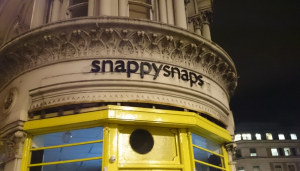Russ Allbery: Cumulative haul
I haven't done one of these in quite a while, long enough that I've
already read and reviewed many of these books.
John Joseph Adams (ed.) The Far Reaches (sff anthology)
Poul Anderson The Shield of Time (sff)
Catherine Asaro The Phoenix Code (sff)
Catherine Asaro The Veiled Web (sff)
Travis Baldree Bookshops & Bonedust (sff)
Sue Burke Semiosis (sff)
Jacqueline Carey Cassiel's Servant (sff)
Rob Copeland The Fund (nonfiction)
Mar Delaney Wolf Country (sff)
J.S. Dewes The Last Watch (sff)
J.S. Dewes The Exiled Fleet (sff)
Mike Duncan Hero of Two Worlds (nonfiction)
Mike Duncan The Storm Before the Storm (nonfiction)
Kate Elliott King's Dragon (sff)
Zeke Faux Number Go Up (nonfiction)
Nicola Griffith Menewood (sff)
S.L. Huang The Water Outlaws (sff)
Alaya Dawn Johnson The Library of Broken Worlds (sff)
T. Kingfisher Thornhedge (sff)
Naomi Kritzer Liberty's Daughter (sff)
Ann Leckie Translation State (sff)
Michael Lewis Going Infinite (nonfiction)
Jenna Moran Magical Bears in the Context of Contemporary Political Theory (sff collection)
Ari North Love and Gravity (graphic novel)
Ciel Pierlot Bluebird (sff)
Terry Pratchett A Hat Full of Sky (sff)
Terry Pratchett Going Postal (sff)
Terry Pratchett Thud! (sff)
Terry Pratchett Wintersmith (sff)
Terry Pratchett Making Money (sff)
Terry Pratchett Unseen Academicals (sff)
Terry Pratchett I Shall Wear Midnight (sff)
Terry Pratchett Snuff (sff)
Terry Pratchett Raising Steam (sff)
Terry Pratchett The Shepherd's Crown (sff)
Aaron A. Reed 50 Years of Text Games (nonfiction)
Dashka Slater Accountable (nonfiction)
Rory Stewart The Marches (nonfiction)
Emily Tesh Silver in the Wood (sff)
Emily Tesh Drowned Country (sff)
Valerie Vales Chilling Effect (sff)
Martha Wells System Collapse (sff)
Martha Wells Witch King (sff)
Poul Anderson The Shield of Time (sff)
Catherine Asaro The Phoenix Code (sff)
Catherine Asaro The Veiled Web (sff)
Travis Baldree Bookshops & Bonedust (sff)
Sue Burke Semiosis (sff)
Jacqueline Carey Cassiel's Servant (sff)
Rob Copeland The Fund (nonfiction)
Mar Delaney Wolf Country (sff)
J.S. Dewes The Last Watch (sff)
J.S. Dewes The Exiled Fleet (sff)
Mike Duncan Hero of Two Worlds (nonfiction)
Mike Duncan The Storm Before the Storm (nonfiction)
Kate Elliott King's Dragon (sff)
Zeke Faux Number Go Up (nonfiction)
Nicola Griffith Menewood (sff)
S.L. Huang The Water Outlaws (sff)
Alaya Dawn Johnson The Library of Broken Worlds (sff)
T. Kingfisher Thornhedge (sff)
Naomi Kritzer Liberty's Daughter (sff)
Ann Leckie Translation State (sff)
Michael Lewis Going Infinite (nonfiction)
Jenna Moran Magical Bears in the Context of Contemporary Political Theory (sff collection)
Ari North Love and Gravity (graphic novel)
Ciel Pierlot Bluebird (sff)
Terry Pratchett A Hat Full of Sky (sff)
Terry Pratchett Going Postal (sff)
Terry Pratchett Thud! (sff)
Terry Pratchett Wintersmith (sff)
Terry Pratchett Making Money (sff)
Terry Pratchett Unseen Academicals (sff)
Terry Pratchett I Shall Wear Midnight (sff)
Terry Pratchett Snuff (sff)
Terry Pratchett Raising Steam (sff)
Terry Pratchett The Shepherd's Crown (sff)
Aaron A. Reed 50 Years of Text Games (nonfiction)
Dashka Slater Accountable (nonfiction)
Rory Stewart The Marches (nonfiction)
Emily Tesh Silver in the Wood (sff)
Emily Tesh Drowned Country (sff)
Valerie Vales Chilling Effect (sff)
Martha Wells System Collapse (sff)
Martha Wells Witch King (sff)

 We are very excited to announce that Debian has selected nine interns to work
under mentorship on a variety of
We are very excited to announce that Debian has selected nine interns to work
under mentorship on a variety of
 So much for my monthly blogging! Here s what I have been up to in the Open Source world over the last 6 months.
Debian
So much for my monthly blogging! Here s what I have been up to in the Open Source world over the last 6 months.
Debian
 .
Arriving in London and finding the Red Hat offices
After being stuck in trains for the weekend, but fortunately arriving at the airport in time, I finally made it to London with quite some delay due to the slow bus transfer from Stansted Airport. After finding the hotel, the next issue was to get food and a place which accepted my credit card, which was surprisingly hard in defence of London I must say though, that it was a Sunday, 7 p.m. and my card is somewhat special (in Canada, it managed to crash some card readers, so they needed a hard-reset). While searching for food, I also found the Red Hat offices where the hackfest was starting the next day by accident. My hotel, the office and the tower bridge were really close, which was awesome! I have been to London in 2008 the last time, and only for a day, so being that close to the city center was great. The hackfest didn t leave any time to visit the city much, but by being close to the center, one could hardly avoid the London experience
.
Arriving in London and finding the Red Hat offices
After being stuck in trains for the weekend, but fortunately arriving at the airport in time, I finally made it to London with quite some delay due to the slow bus transfer from Stansted Airport. After finding the hotel, the next issue was to get food and a place which accepted my credit card, which was surprisingly hard in defence of London I must say though, that it was a Sunday, 7 p.m. and my card is somewhat special (in Canada, it managed to crash some card readers, so they needed a hard-reset). While searching for food, I also found the Red Hat offices where the hackfest was starting the next day by accident. My hotel, the office and the tower bridge were really close, which was awesome! I have been to London in 2008 the last time, and only for a day, so being that close to the city center was great. The hackfest didn t leave any time to visit the city much, but by being close to the center, one could hardly avoid the London experience 
 )).
The incarnation of GNOME Software used by endless looks pretty different from what the normal GNOME user sees, since it s adjusted for a different audience and input method. But it looks great, and is a good example for how versatile GS already is! And for upstream GNOME, we ve seen some pretty great mockups done by Endless too I hope those will make it into production somehow.
)).
The incarnation of GNOME Software used by endless looks pretty different from what the normal GNOME user sees, since it s adjusted for a different audience and input method. But it looks great, and is a good example for how versatile GS already is! And for upstream GNOME, we ve seen some pretty great mockups done by Endless too I hope those will make it into production somehow.

 ).
For me, being the only (and youngest ^^) developer at the hackfest who was not employed by any company in the FLOSS business, the hackfest was also motivating to continue to invest spare time into working on these projects.
So, the only thing left to do is a huge shout out of THANK YOU to the Ubuntu Community Fund and therefore the Ubuntu community for sponsoring me! You rock! Also huge thanks to Canonical for organizing the sponsoring really quickly, so I didn t get into trouble with paying my flights.
).
For me, being the only (and youngest ^^) developer at the hackfest who was not employed by any company in the FLOSS business, the hackfest was also motivating to continue to invest spare time into working on these projects.
So, the only thing left to do is a huge shout out of THANK YOU to the Ubuntu Community Fund and therefore the Ubuntu community for sponsoring me! You rock! Also huge thanks to Canonical for organizing the sponsoring really quickly, so I didn t get into trouble with paying my flights.


 We're excited to announce that Debian has selected 29 interns to work with us
this summer: 4 in
We're excited to announce that Debian has selected 29 interns to work with us
this summer: 4 in  My significant other is running Debian stable on her laptop, and it has worked fine for quite a while. But since a week or two, she could not access her University IMAP account via Evolution. Obviously quite a showstopper!
Today I had a closer look, and my suspicion was that the University changed their SSL configuration due to the recent POODLE attack and that Evolution was incompatible with that. After some more searching, I found that Ubuntu had applied
My significant other is running Debian stable on her laptop, and it has worked fine for quite a while. But since a week or two, she could not access her University IMAP account via Evolution. Obviously quite a showstopper!
Today I had a closer look, and my suspicion was that the University changed their SSL configuration due to the recent POODLE attack and that Evolution was incompatible with that. After some more searching, I found that Ubuntu had applied  A pattern I see quite often on help channels goes like this.
A pattern I see quite often on help channels goes like this.










 It s seeming increasingly likely that reports regarding the future of Banshee, Tomboy, and the rest of the Mono stack in the default Ubuntu desktop install are accurate. Ubuntu 12.04 will likely be the first Ubuntu release since 5.10 not to ship with any Mono apps in the default install ending a run of 12 releases over 6 years. The decision seems to have come about during the default apps session at the Ubuntu Developer Summit just ended in Orlando, Florida. Prior to
It s seeming increasingly likely that reports regarding the future of Banshee, Tomboy, and the rest of the Mono stack in the default Ubuntu desktop install are accurate. Ubuntu 12.04 will likely be the first Ubuntu release since 5.10 not to ship with any Mono apps in the default install ending a run of 12 releases over 6 years. The decision seems to have come about during the default apps session at the Ubuntu Developer Summit just ended in Orlando, Florida. Prior to 



 Dear lazyweb,
In a couple of weeks I'm likely to be going cycle touring around
the North East of England. This will involve first taking a train
from Nottingham. While looking at train options just now, I was
reminded of a little survey that I wanted to conduct.
Taking bicycles on trains in the UK can be a hit-or-miss
experience.
The UK's train routes are operated by a variety of
Dear lazyweb,
In a couple of weeks I'm likely to be going cycle touring around
the North East of England. This will involve first taking a train
from Nottingham. While looking at train options just now, I was
reminded of a little survey that I wanted to conduct.
Taking bicycles on trains in the UK can be a hit-or-miss
experience.
The UK's train routes are operated by a variety of 
 Working on and for Debian for the whole millennium already it would had been hard to not notice Ubuntu through the times. Given that fixing bugs in the package is in the interest of all involved parties I started to get curious for the
Working on and for Debian for the whole millennium already it would had been hard to not notice Ubuntu through the times. Given that fixing bugs in the package is in the interest of all involved parties I started to get curious for the